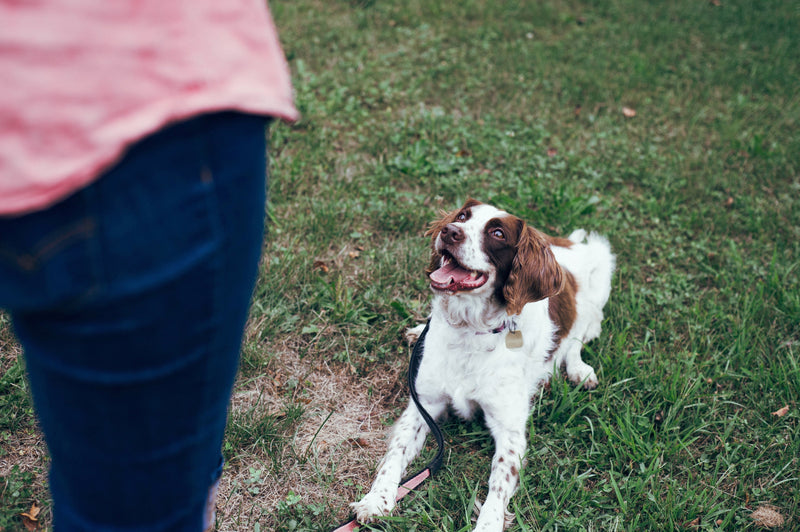
Dog Reactivity Towards Noises: Helping Your Pet Overcome Sound Sensitivity
Share
For many pet owners, witnessing their beloved canine companion exhibiting signs of distress or excitement in response to certain sounds can be both heartbreaking and challenging to manage. When discussing dog reactivity towards noises, it is crucial to recognize the symptoms and understand the underlying causes to effectively address the issue.
The term 'reactivity' typically refers to a dog's heightened response to specific stimuli, which in this case are noises. These responses can range from mild unease to extreme fear or aggression, depending on the dog and the nature of the sound involved. Reactivity can be triggered by a variety of factors, including past experiences, genetic predisposition, or a lack of exposure to certain sounds during the critical puppy socialization period.

Identifying Symptoms of Noise Reactivity
Understanding whether your dog is reactive to noises starts with observing their behavior in response to different sounds. Do they cower, bark excessively, or attempt to flee? Recognizing these indicators is the first step toward managing and subsequently resolving the issue.
Common Noises That Trigger Reactivity
Certain noises are notorious for triggering reactions in dogs. Thunderstorms, fireworks, and even the vacuum cleaner are among the usual suspects. However, more everyday sounds like the doorbell, passing traffic, or even household appliances can also provoke anxiety or excitement in some dogs.
Behavioral Signs to Look Out For
Reactivity can manifest in several ways. Dogs may exhibit visible stress signals such as panting, pacing, drooling, or whining. In some cases, they might engage in destructive behavior or show aggression. Understanding these signs can help prevent potential harm to both the dog and others.
Exploring the Root Causes of Reactivity
To effectively manage a dog's reactivity towards noises, it is essential to explore and understand the root causes. This understanding can inform the methods used to address and mitigate the reactivity.
Genetic Predisposition
Certain breeds may be naturally more prone to noise sensitivity. For example, herding breeds like Border Collies, which are often on high alert, might react more intensely to unexpected sounds.
Past Experiences and Socialization
Negative experiences or the lack of positive exposures to certain noises during their early life stages can make dogs more sensitive as adults. It's critical to provide gradual exposure to various sounds to prevent the development of sound phobias.
Strategies to Manage and Mitigate Reactivity
Once you have identified that your dog has a sound sensitivity, implementing appropriate management strategies becomes paramount. With patience and consistency, it is possible to reduce the intensity of their reactions.
Desensitization and Counterconditioning
One effective approach is desensitization and counterconditioning. This involves slowly exposing your dog to the sound they are sensitive to at a low volume. Over time, you gradually increase the sound level while pairing it with positive experiences, like treats or play, to change the dog's emotional response.
Creating a Safe Environment
Provide a safe haven for your pet where they can retreat during a noise event. This could be a quiet room equipped with comforting items such as their favorite blanket or toy. Consider soundproofing certain areas to help buffer the noise.
Professional Assistance and Resources
In severe cases, where reactivity drastically affects your dog's quality of life, seeking professional help is advisable. A certified animal behaviorist or a dog trainer specializing in anxiety issues can provide tailored strategies to help manage your dog's reactivity.
Additionally, numerous resources are available to support your journey. Websites such as AKC offer expert advice on training and managing anxiety in dogs.
For additional insights into how pets react to various stimuli, consider reading this article about reactivity towards TV. It's crucial to tailor these approaches to suit your dog's individual needs for maximum benefit.
Conclusion: Taking a Compassionate Approach
Managing dog reactivity towards noises involves a thoughtful approach that emphasizes patience and understanding. By taking steps to understand the root of the reactivity, implementing gradual desensitization techniques, and seeking professional guidance when necessary, pet owners can significantly improve the quality of life for their canine companions. Remember, the ultimate goal is to foster a sense of security and trust, assisting your dog in feeling more comfortable and confident in their environment.

FAQ about Dog Reactivity Towards Noises
1. Can all dogs be desensitized to loud noises?
While many dogs can benefit from desensitization, each dog's adaptability levels vary. Patience and persistence are key, and professional guidance is often recommended for severe cases.
2. How long does it take to see improvement with desensitization?
The timeline for improvement can vary widely depending on the individual dog and the consistency of the training regimen. Some may show progress in a few weeks, while others may take months or longer.
3. Are there specific tools or products that can help with noise sensitivity?
Yes, products such as noise-cancelling headphones for dogs or anxiety wraps can offer additional support alongside behavioral strategies.
This article contains affiliate links. We may earn a commission at no extra cost to you.
